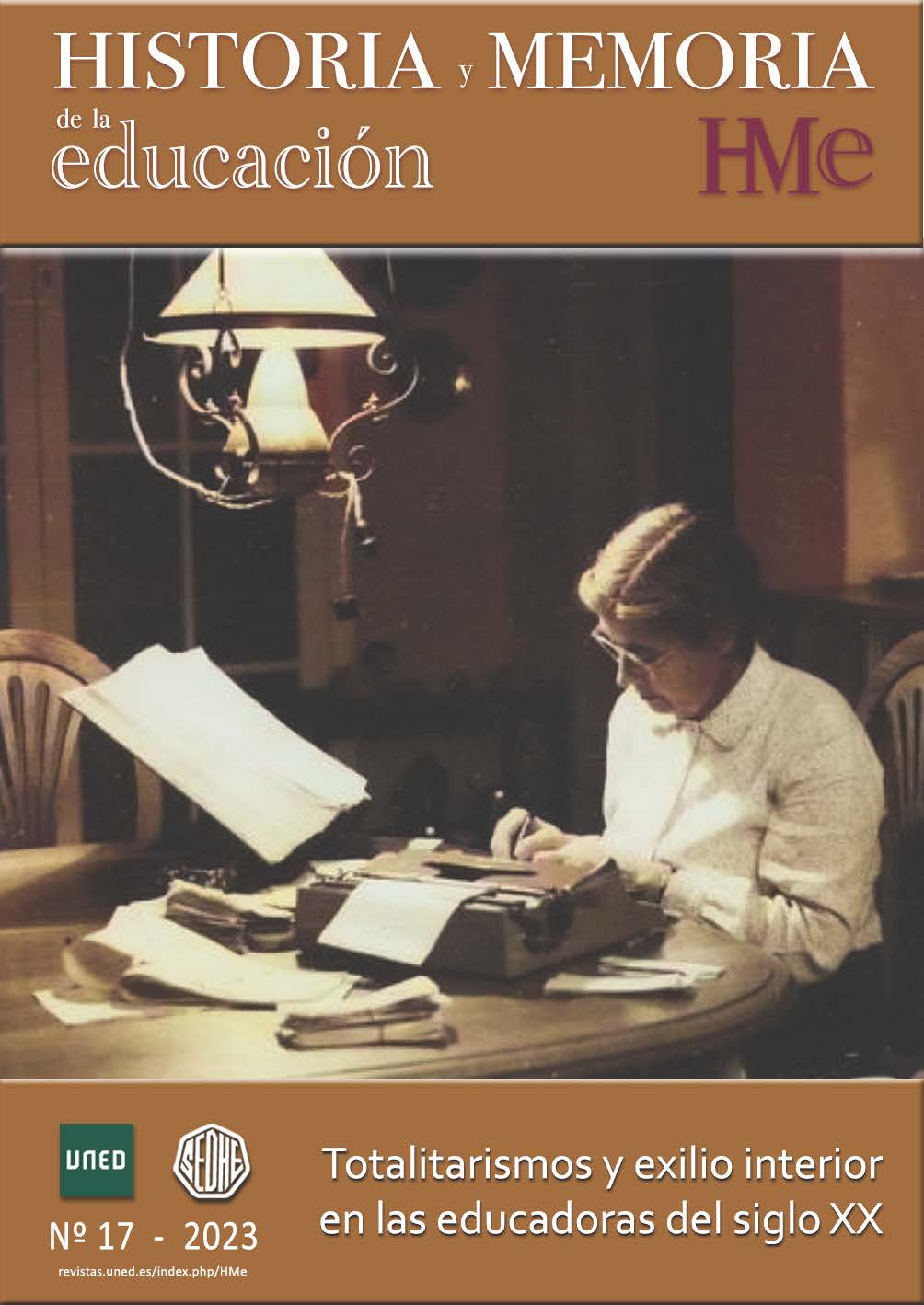Soñando tierras lejanas. De cómo el fascismo construyó a las mujeres coloniales (1937-1941)
DOI:
https://doi.org/10.5944/hme.17.2023.33727Palabras clave:
Fascismo, Propaganda para las mujeres, Imperialismo colonial, Prensa fascista, África Oriental ItalianaResumen
El fascismo había adoptado una estrategia patriarcal dirigida a las mujeres desde la toma del poder en 1922. La política natalista, de la que el fascismo fue un firme defensor por su adhesión a las teorías de Riccardo Korherr, Federico Marconcini y Ferdinando Loffredo, relegaba a las mujeres al papel exclusivo de esposa y madre, una mera máquina reproductora para aumentar el número de italianos que servirían al régimen y así establecer una estrategia bélica colonial siguiendo el ejemplo de otras naciones europeas. La guerra por la conquista del Imperio en África Oriental derivó en la necesidad de enviar mujeres jóvenes para aumentar los núcleos familiares que se crearían en Etiopía. Se puso en marcha, de esta forma, una estrategia poblacional que planteaba la necesidad de desarrollar un modelo educativo diferente para las jóvenes, con el fin de que pudieran vivir en África y así ser más activas y dinámicas. Las altas jerarquías fascistas decidieron explotar el papel de asociaciones de mujeres e impulsar un programa formativo uniforme a escala nacional antes de enviar a las jóvenes a territorios africanos.
La investigación se lleva a cabo a través de la prensa de la época como L’Azione coloniale. Se examinará también el libro único de texto que se utilizó en los cursos de preparación para la vida en las colonias africanas. El objetivo es comprender si el cambio producido en la política educativa dirigida a un grupo de jóvenes elegidas por conveniencia puede haber transformado la imagen general de la mujer en un nivel simbólico en los últimos años del régimen.
Descargas
Citas
Aruffo, Alessandro. Il colonialismo italiano. Da Crispi a Mussolini. Rome: Datanews, 2010.
Barrera, Giulia. “Mussolini’s colonial race laws and state-settler relations in Africa Orientale Italiana (1935-1941)”. Journal of Modern Italian Studies 8, no. 3 (2003): 425-443.
Ben-Ghiat, Ruth. Fascism Modernities: Italy, 1922-1945. Berkeley: University of California Press, 2001.
Bottoni, Riccardo (ed.). L’Impero fascista: Italia ed Etiopia (1935-1941). Bologna: il Mulino, 2008.
Brioni, Simone and Shimelis Bonsa, Gulema. The Horn of Africa and Italy. Oxford: Peter Lang, 2018.
Cagnolati, Antonella, Follacchio, Sara. “Valorizzare, inquadrare, orientare. Il ruolo dell’Associazione nazionale fascista donne artiste e laureate”. Annali di storia delle università italiane 26, no. 1 (2022): 27-44.
Calchi Novati, Gian Paolo. L’Africa d’Italia. Rome: Carocci, 2011.
Cannistraro, Philip V. La fabbrica del consenso. Fascismo e mass media. Rome-Bari: Laterza, 1975.
Cassata, Francesco. La Difesa della Razza: politica, ideologia e immagine del razzismo fascista. Torino: Einaudi, 2008.
Curti, Daniela. “Il fascismo e le donne: imposizione e accettazione della ‘mistica della maternità’”. Italian Studies in Southern Africa/Studi di Italianistica nell’Africa Australe 9, no. 2 (1996) 6-23.
De Grand, Alexander J. “Women under Italian Fascism”. The Historical Journal 19, no. 4 (Dec. 1976): 947-968.
De Grand, Alexander J. “Mussolini’s Follies: Fascism in Its Imperial and Racist Phase, 1935-1940”. European History 13, no. 2 (2004): 127-147.
De Grazia, Victoria. How Fascism Ruled Women. Italy 1922-1945. Berkeley: University of California Press, 1992.
Ertola, Emanuele. In terra d’Africa. Gli italiani che colonizzarono l’impero. Bari-Rome: Laterza, 2017.
Fraddosio, Maria. “Le donne e il fascismo. Ricerche e problemi di interpretazioni”. Storia contemporanea 1 (1986): 95-135.
Ghezzi, Carla. “Famiglia, patria, impero: essere donna in colonia”. I sentieri della ricerca. Rivista di storia contemporanea 3 (2006): 91-129.
Graziosi, Mariolina. La donna e la storia. Identità di genere e identità collettiva nell’Italia liberale e fascista. Naples: Liguori, 2000.
Gros, Pierantonio. “Il diario di Maria Teresa Rossetti. Una giovane intellettuale tra fascismo e antifascismo”. In Sulla crisi del regime fascista, 1938-1943. La società italiana dal “consenso” alla Resistenza, edited by Angelo Ventura, 421-462. Venice: Marsilio, 1996.
Guglielman, Eleonora. “Dalla per “scuola per signorine” alla “scuola delle padrone”: il Liceo femminile della riforma Gentile e i suoi precedenti storici”. In Da un secolo all’altro, edited by Marco Guspini, 155-195. Rome: Anicia, 2004.
Innocenti, Marco. Le Signore del fascismo. Donne in un mondo di uomini. Milano: Mursia, 2001.
Ipsen, Carl. Dictating Demography: the Problem of Population in Fascist Italy. Cambridge: Cambridge University Press, 1996.
Labanca, Nicola. Oltremare: storia dell’espansione coloniale italiana. Bologna: Il Mulino, 2002.
Lombardi-Diop, Cristina. Pioneering Female Modernity: Fascist Women in Colonial Africa. In Italian Colonialism, edited by R. Ben-Ghiat, M. Fuller, 145-154. New York-Houndsmill: Palgrave MacMillan, 2005.
Macciocchi, Maria Antonietta. La donna “nera”. “Consenso” femminile e fascismo. Milan: Feltrinelli, 1976.
Meldini, Piero. Sposa e madre esemplare. Ideologia e politica della donna e della famiglia durante il fascismo. Florence: Guaraldi, 1975.
Motti, Lucia, Marilena Rossi Caponeri. Accademiste a Orvieto. Donne ed educazione fisica nell’Italia fascista 1932-1943. Perugia: Quattroemme, 1996.
Noether, Emiliana. “Italian Women and Fascism: A Re-evaluation”. Italian Quarterly, XXIII, 90 (1982) 69-80.
Pickering-Iazzi, Robin. “Structures of Feminine Fantasy and Italian Empire Building, 1930-1940”. Italica, 77, no. 3 (2000) 400-417.
Pisanty, Valentina (ed.). La Difesa della Razza. Antologia 1938-1943. Milan: Bompiani, 2006.
Podestà, Gian Luca. “L’émigration italienne en Afrique Orientale”. Annales de Démographie Historiques. 1, CXIII (2007) 59-84.
Ribuoli, Patrizia. Condizione e ruoli della donna nell’ordinamento fascista. Milan: Università Cattolica del Sacro Cuore, 1980.
Ruggeri, Simona Viviana. Donne e giornali nel fascismo: dizionario storico-biografico. San Gavino Morreale: Edizioni Fiore, 2004.
Sbacchi, Alberto. Il colonialismo italiano in Etiopia: 1936-1940. Milan: Mursia, 1980.
Spadaro, Barbara. “Intrepide massaie. Genere, imperialismo e totalitarismo nella preparazione coloniale femminile durante il fascismo (1937-1943)”. Contemporanea. XIII, no. 1 (2010) 27-52.
Terhoeven, Petra, Liebespfand fürs Vaterland. Krieg, Geschlecht und faschistische Nation in der Gold- und Eheringsammlung 1935-1936. Tubingen: Max Niemeyer, 2003.
Thalmann, Rita (ed.). Femmes et fascismes. Paris: Tierce, 1986.
Vicini, Sergio. Fasciste. La vita delle donne nel Ventennio mussoliniano. Bresso: Hobby & Work, 2009.
Willson, Perry. “Empire, Gender and the ‘Home Front’ in Fascist Italy”. Women’s History Review 16, 4 (2007): 487-500.
Willson, Perry. Women in Twentieth-Century Italy. New York: Palgrave Macmillan, 2010.
Descargas
Publicado
Cómo citar
Número
Sección
Licencia
Derechos de autor 2022 Historia y Memoria de la Educación

Esta obra está bajo una licencia internacional Creative Commons Atribución-NoComercial 4.0.

Reconocimiento – NoComercial (by-nc 4.0): Se permite la generación de obras derivadas siempre que no se haga un uso comercial. Tampoco se puede utilizar la obra original con finalidades comerciales.










